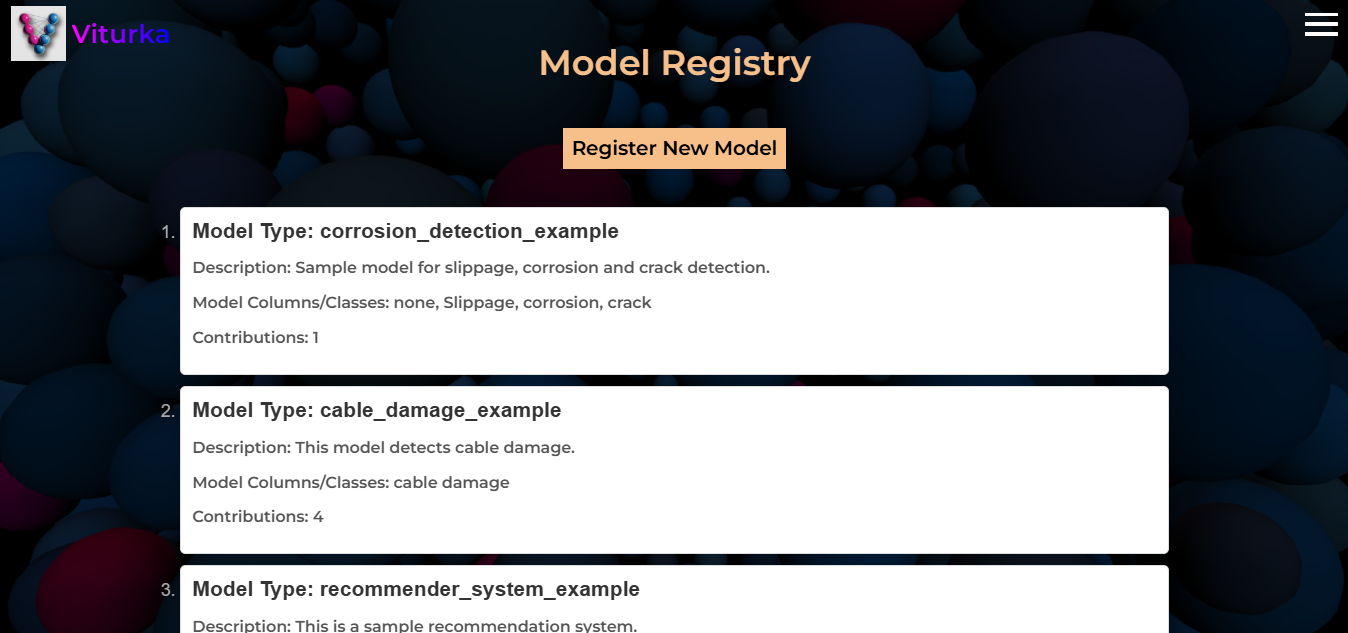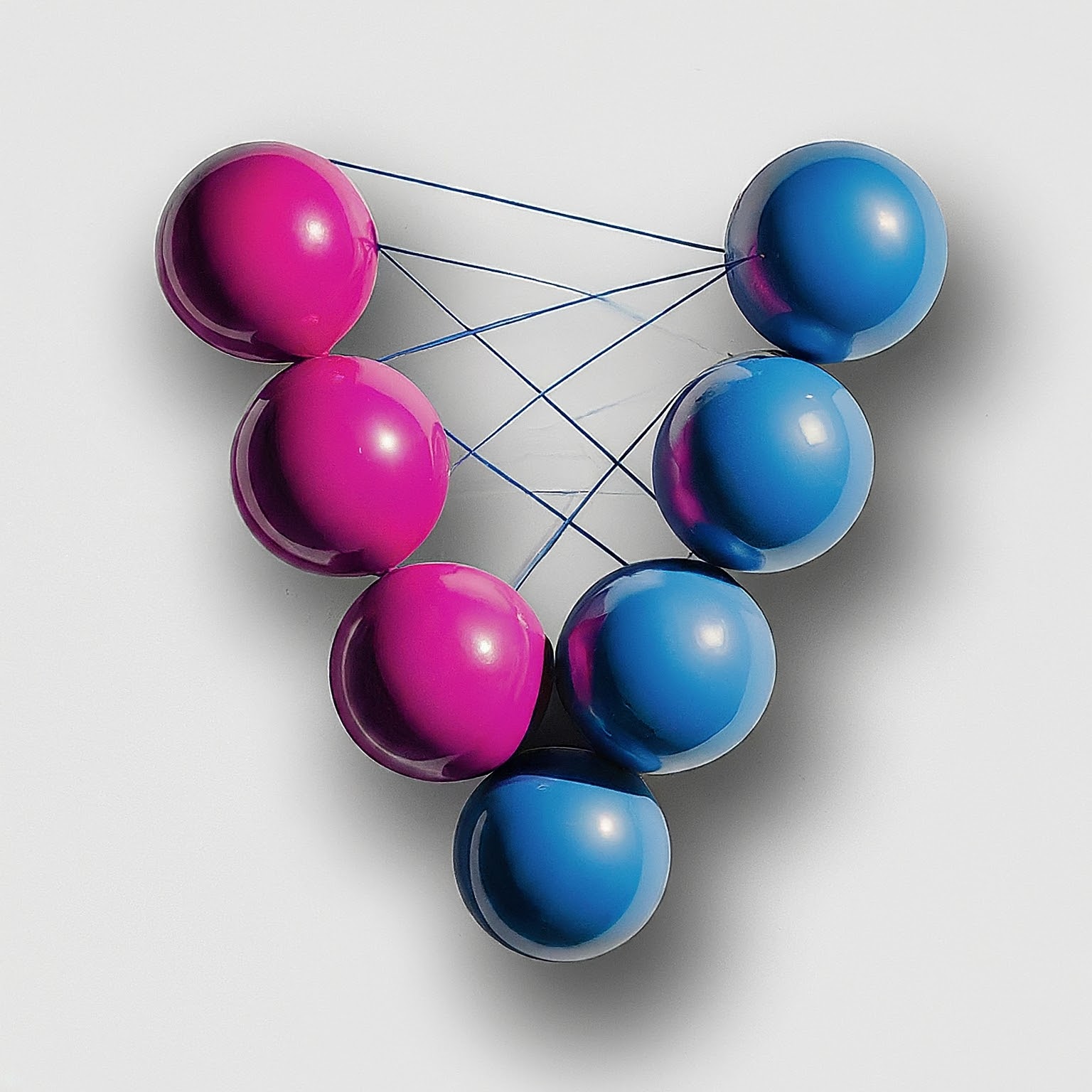Future of AI is Specialized and Collaborative
Build Specialized AI models and Federated Analytics Solutions
Use Viturka's Python SDK for low-code development of specialist AI models
Install Viturka using pip commmand in the terminal
Preprocess the dataset, train, and evaluate the model in just a few lines of code
1from viturka.FM_als import train_model, evaluate_model 2 3local_model, X_train, X_test, y_test, vectorizer, scaler, df = train_model( 4 file='Music_info.csv', 5 target_column='danceability', # Column to predict 6 numerical_columns=[ 7 'valence', 'energy', 'loudness', 8 'speechiness', 'acousticness', 9 'liveness', 'tempo', 'key', 'time_signature' 10 ], 11 categorical_columns=[ 12 'name','artist', 'genre' 13 ], 14 item_id_column = "name", 15 n_iter=600, 16 init_stdev=0.1, 18 l2_reg_w = 0.1, 19 l2_reg_V = 0.1, 20 rank= 10, 21 vectorizer=vectorizer, 22 pre_process= True, 23 advanced_imputation="knn" 24) 25 26# Evaluate the model 27predictions, mse = evaluate_model(local_model, X_test, y_test, scaler) 28print(f"Mean Squared Error: {mse}")
Use the client module to upload the locally trained model and download the global mode
1from viturka.client import ModelUploader 2 3# Upload the locally trained model to the global pool and get the global model 4global_model = ModelUploader("bc734e0906e0XXXXXX0c382a9cf80d").upload_model(model=local_model, model_type="music_recommender_example", vectorizer=vectorizer)
Choose from list of models to use and collaborate on or create your own

How the Cold Start Problem Produces Underperforming Recommendation Engines and Analytics
The cold start problem significantly affects the performance of recommendation engines and analytics in new startups and data-driven products. When a system lacks user data or historical information, it struggles to deliver accurate or personalized recommendations. This is especially problematic for machine learning models and AI-driven platforms that rely on large datasets to function effectively.
In the early stages of a product, the absence of sufficient data leads to generic or irrelevant recommendations. This lack of personalization can frustrate users, making them less likely to engage with the platform. For instance, in an e-commerce platform, a recommendation engine may suggest random products because it doesn't yet understand user preferences, resulting in poor user satisfaction.
Similarly, analytics tools that depend on user behavior patterns or trends will provide incomplete or inaccurate insights during the cold start phase. This affects decision-making and limits the ability to optimize user experiences, marketing strategies, or product development.
How Viturka Solves the Cold Start Problem
Viturka offers a powerful solution to the cold start problem by allowing multiple organizations or devices to collaborate without sharing raw data. In a collaborative and decentralized machine learning system, each organization trains a local model on its private data, and only the model updates (not the data) are shared with a central server. This enables the platform to build a more robust recommendation engine based on aggregated insights from different sources.
For startups and platforms that are new to the market, Viturka can eliminate the initial scarcity of data by leveraging models trained across various organizations. This approach enhances the quality of recommendations from the start, providing personalized results without needing large amounts of data from individual users. Furthermore, it preserves privacy and data security, which is particularly important in industries like healthcare, finance, or e-commerce where data sensitivity is a concern.
Viturka for Collaborative AI/ML Development
Viturka enables multiple organizations to collaborate on machine learning model development while ensuring data privacy and security. Here’s how it facilitates collaborative inter-organizational ML model development:
1. Privacy Preservation
Viturka allows organizations to collaboratively train a model without sharing their raw data. Instead of sharing the actual data, organizations share model updates (such as gradients or parameters). This method ensures privacy, avoiding legal and regulatory complications around data sharing.
2. Data Security
Since raw data remains within each organization, the risk of breaches or unauthorized access to sensitive information is minimized. Advanced encryption techniques like homomorphic encryption and differential privacy can protect model updates and prevent exposure of sensitive information through model parameters.
3. Collaborative Model Training
Organizations can collectively build more powerful machine learning models by contributing their individual datasets to train a single, shared model. The aggregation of model updates ensures that:
- The model benefits from the diversity of data across organizations.
- The resulting model is more generalized and robust across different domains.
4. Addressing Data Siloing
Organizations often face issues with data silos due to competitive, regulatory, or privacy concerns. Federated learning overcomes this by allowing collaboration without direct access to each other’s data, enabling multiple organizations to work together without compromising their data privacy.
5. Maintaining Competitive Advantage
Viturka allows organizations in competitive industries (e.g., finance, healthcare) to collaborate on shared models, benefiting from a better-performing model while keeping their proprietary data and business strategies confidential. It fosters collaboration without sacrificing competitive advantages.
6. Cost and Resource Efficiency
Collaborative AI developement allows organizations to share the computational load of training large models across multiple organizations. Each organization trains locally on their data, reducing the need for heavy infrastructure or centralized computational power.
7. Compliance with Data Regulations
In sectors where data is heavily regulated (e.g., healthcare, finance), federated learning helps organizations comply with regulations like GDPR and HIPAA by keeping data within their control while still contributing to a collaborative model.
8. Customizable Local Models
Organizations have the flexibility to fine-tune the global model to fit their specific needs and datasets. While participating in the collaborative model, they can also retain versions that are customized for their specific use cases.
9. Better Generalization Across Domains
Since different organizations contribute diverse data, federated learning allows the creation of models that generalize better across domains, geographies, and user groups. For instance:
- Healthcare: Hospitals in different regions can collaboratively train a disease prediction model that is accurate across different populations.
- Finance: Banks with different customer demographics can collaboratively build a fraud detection model that generalizes across different financial systems.
10. Continuous Learning and Improvement
Viturka supports continuous model improvement as more data becomes available over time. Organizations can update the shared model periodically, ensuring it evolves with real-world trends.
11. Decentralization
Since Viturka is decentralized, there is no need for a central repository of data. This reduces the risks of a single point of failure, such as a central server being hacked or compromised. Each organization keeps control of its data.
Viturka unlocks new possibilities for inter-organizational collaboration, allowing the development of powerful, generalized machine learning models while ensuring data privacy, security, and regulatory compliance.
